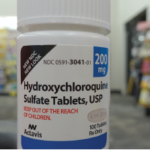Glucocorticoids remain a prominent part of care for many patients with SLE but can have toxic side effects; this EULAR 2022 session discussed one institution’s approach to lower the dosage.


Glucocorticoids remain a prominent part of care for many patients with SLE but can have toxic side effects; this EULAR 2022 session discussed one institution’s approach to lower the dosage.

Clinicians have numerous treatment options for SLE; in a EULAR 2022 session, some of the newer therapies were reviewed.
Chambers et al. found no evidence of an increased risk of major structural birth defects nor any increase in a wide range of other pregnancy outcomes attributable to prenatal exposure to hydroxychloroquine.
A special article in the December issue of Arthritis & Rheumatology summarizes the current understanding of the cardiac toxicity of HCQ and CQ.

David R. Karp, MD, PhD |
We are now a year-and-a-half into the COVID‑19 pandemic, and rheumatologists and rheumatology professionals are still facing some of the same challenges that began in spring 2020, as well as new ones. Most recently, we learned that COVID‑19 vaccine efficacy is reduced in some patients on immunosuppressive therapies and the need for additional immunization is…

At the 2021 ACR State-of-the-Art Clinical Symposium, Saira Sheikh, MD, associate professor of Medicine and director of the Rheumatology Lupus Clinic, University of North Carolina, Chapel Hill, provided an update on the past, present and future of the management of systemic lupus erythematosus (SLE). This year, hydroxychloroquine received a great deal of attention, given early…

Since 1991, hydroxychloroquine (HCQ) has been a staple for the treatment of patients with systemic lupus erythematosus; it has been shown to improve survival, reduce cardiovascular risk, thrombosis and renal damage, delay or prevent lupus cerebritis and more. However, HCQ can potentially bind in the retinal pigment epithelium and cause degeneration of photoreceptors, leading to…

Elizabeth (Blair) Solow, MD |
ACR CONVERGENCE 2020—Held Nov. 5–9, the ACR’s first fully virtual annual meeting provided participants with a vast repository of new research related to rheumatoid arthritis (RA). To help you sort through the noise, Elizabeth (Blair) Solow, MD, an assistant professor of medicine in the Division of Rheumatic Diseases at UT Southwestern Medical Center, Dallas, offered …

ACR Convergence 2020—At two plenary sessions, speakers highlighted key findings, including results on the QTc interval in patients on hydroxychloroquine, and data from a study on denosumab vs. alendronate for glucocorticoid-induced osteoporosis. The QTc Interval & Hydroxychloroquine The safety profile and optimal dosing of hydroxychloroquine has been a topic for decades because it is known…
The conversation with Stephen Hahn, MD, addressed challenges associated with hydroxychloroquine access during the COVID-19 public health emergency and handling patient concerns about potential cardiac side effects.